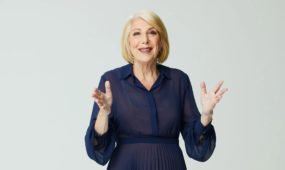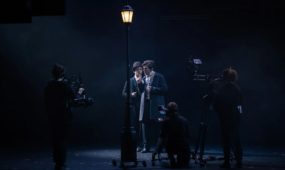Kate Ceberano talks about her last Cabaret Festival and what's next
Arts
KATE Ceberano sits down before the start of her third and final Adelaide Cabaret Festival and talks legacy, audience interaction and how she wants to be one of Barry Humphries “bitches” when he takes over the reigns in a week.

Sign up to receive notifications about new stories in this category.
Thank you for subscribing to story notifications.
Jim: We are here at the Festival Centre in Adelaide and I'm talking with Kate Ceberano about the Cabaret Festival. The theme this year is ‘not your usual suspects’, so knowing you that’s going to be quite wild, how are you going to fulfil that promise?
Kate: (laughs) Ah, well ‘not the usual suspects’ is a great tagline because in actual fact it does exemplify the cabaret spirit. We often have artists who come back each and every year and they have completely transformed themselves, into an entirely new shows, new characters, whole new visual aesthetic, and you can’t be certain if last year’s Paul Capsis will be the same this year’s Paul Capsis. And I just love to play on the words there, it seemed appropriate.
Listen: Your browser does not support this audio format.
Jim: Do you get any comments, or even flak, from the usual cabaret community that might have a more narrow view of what cabaret is?
Kate: I think we’re very blessed that our audience for cabaret are very open minded about, and certainly the definition of cabaret is very elastic.
If we look at its original definition, which is very simple, it's simply, entertainment with food and wine provided (laughs) and I guess in many ways that does sort of explain, in a sense what it is, which is a convivial environment where you can talk, you can be free to engage with the artist, and exchange with the artist.
Often the cabaret artist is very nimble and can answer appropriately to all manner of questioning under their, you know, the work that they're putting up.
It’s asking for conversation – it’s begging for it – and we as live artists know what to do with that.
I think that the cabaret audience are probably more open minded for that, and when, when, if there was any criticism for the ‘usual suspects’ I don’t even think they could charge any of us for being usual because generally we’re not.
We’re not usual, we’re not normal, we’re certainly not go quietly into the… the black of night. It’s rage, rage, rage and we burn so bright and, and it’s no wonder we’re all exhausted, absolutely and utterly exhausted at the end.
Listen: Your browser does not support this audio format.
Jim: And on the audiences, you know, this is your third Cabaret Festival, have you seen the audience in Adelaide mature to understand that’s all what cabaret’s about? It’s interacting with these people on stage and you know, that they have permission to yell out and stomp their feet and heckle? (laughs)
Kate: Indeed, ah the cabaret audiences in Adelaide are probably unlike any other audience in the rest of the world. Adelaide is a festival city, is indulged greatly on many levels for high art, but also alternative and fringe art.
It’s a wonderful blessing that the cabaret is in itself inherently commercial. So, given that it’s commercial, it’s… it’s non-discriminatory: as to what age, or what kind of public you may get.
You know, the swarms of the 70 year old plus women, and they are as equally chuffed as the 17-year-old kind of new cabaret punks if you will and they’re a very discerning audience. They may come in one day, being that it is a winter festival, and everything belongs on site during the winter, they don’t leave, they may come to see one show but they may go on to three or four other shows in the same day. And in order to maintain their loyalty we give them piles of free entertainment, so when they come in and out of the venues where they’ve seen these artists, these artists themselves may randomly come into the backstage club and collaborate with each other.
We had Mary Wilson for instance, get up and we were singing songs ah, of The Supremes, we’ve had New York artist Joey Arias, this sort of wonderful, transexual kind of Andy Warhol pinup, you know, performing with late 60’s Barb Jungr, you know, she kind of doing Leonard Cohen tunes. It’s just this fantastic universe where we’re ageless and of a social strata which seems to have no name or title. We’re not of a kinda economic hierarchy it’s… it’s… really it’s Sans Frontieres you know!
Listen: Your browser does not support this audio format.
Jim: When you’re going out and finding all these acts and all these people to come to Adelaide, do you explain to them, or do you even have to explain to them, that after their shows, they’ll be free to come to the backstage club or the piano bar and continue the party? Or is it just something organic in cabaret?
Kate: Well actually the international artists are a little leery at the concept at first, – and you have to imagine their coming from an environment where the celebrity culture is very different from Australia. They can never quite believe how accessible they are actually allowed to be with audiences without the fear of consequence. Do you know, if you were to go to any other festival, in any other world and you were some of these artists, like Idina Menzel or Kristen Chenoweth, there would be too many fans to afford you the luxury of just letting it all hang out and have a bit of fun.
Lea Salonga for instance, she, again one of the great voices of the Disney, is so well loved in certain places, certainly the Philippines, that, she really can't have a normal life. So the international artists come here and they see and feel the atmosphere is quite different and that the audiences are really nonplussed about them as people (phone beeps), sorry I will just say that again, rather nonplussed about them as people. But are more excited about what they do random performances, what they do in their artform.
Ah, and so, you… you get the paid audience, they come and see the event that they expected to see, but then they stay because they want to see the unexpected, and they expect that.
So yes, we had artists last year, oh one beautiful moment that I will never ever forget. I don’t think, it’s probably my finest moment in the three year tenure. I had Martha Wainwright here with her children, Molly Ringwald was here with her children and I had my daughter Gypsy as well. We thought that just for fun, a wombat rescue society, we asked if they may bring a couple of wombats to the hotel so that these international guests and their children could have this really great up close and personal experience with an Australian animal. Well there we were in the middle of the lobby and we’re sitting there, all these wonderful artists, just completely informal, with our children, looking and loving these wonderful animals and who should walk in with his whole delegation? The Dalai Lama (laughs). And it could only happen at the Adelaide Cabaret Festival. And then the the Dalai Lama wants to hold the wombat as well, I don’t know, there’s something in that that’s very telling on the actual atmosphere, it’s a very convivial and informal atmosphere.
Listen: Your browser does not support this audio format.
Jim: I know that you bring in all these great international acts, but how have you been balancing the local versus international?
Kate: We imbue them with exactly the same value. There is absolutely no greater than, lesser than. This festival is, ahh, you know it’s very fraternal.
I’ve taken the role as a sort of maître d’ very seriously, and I’ve always been very accessible to the artists, but also to the public as well. For instance, one night Camille O’Sullivan, one of the artists from Ireland, had something happen with one of the audience members, which is, which can be the case with cabaret, where they may tell you things that you're not necessarily interested in listening to and it was a wonderful service to be able to come in between and to be able to sort out what exactly happened, have the artist again feel secure that she’s free to roam and be confident with the audience. Also, the audience member to was um, from my point of view, was told as you are now our guest and you’re to behave in accordance with this informality if you're going to have such contact with someone. Just keep your manners in, do you know what I mean (laughs) because that’s what makes the whole thing go round.
The administration here is, is so comfortable with looking after the acts and they treat them like silk worms. I don't think I’ve ever seen artists being treated more respectfully with sound, with the, umm the food and beverage and the basic, you know, keeping them informed as to where they’re going to be. There’s nothing that’s in disorder or chaos, with the administration, everything runs beautifully, to clock work, it’s just like a well-oiled machine and so the artists themselves they do really relax. So yeah we have our, sometimes there are, there are certain sort of liabilities to that, but none that have been more than that.
Listen: Your browser does not support this audio format.
Jim: And as you say it’s a winter festival, so it’s all very nice to come in and be all nice and toasty warm in the Festival Centre, and the party’s all in one place. Is that the same this year, is it all going to be here?
Kate: It always is, it it’s the one of the greatest things about this festival at this time of year is it is a hub, it’s a hearth and it’s a great warm space, that, when I think of it, if I had to imagine that you could shrink wrap this whole venue into something that seems as warm as a cotton club but one of the things I’ve always wanted to do was to host an event space like that, where it’s a sort of access all areas, you know, in front of and behind stage and that there's this feeling, you know, as you're walking through the lobby clouds of artists coming in straight in off stage still sweaty and hot. You know sitting down and having a drink or a bowl of pasta in the lobby and then going straight on into a sort of impromptu performance. By watching and having the artists themselves watching other artists, which is always lovely. Being able to appreciate, when we don’t often have time to see other performers.
Jim: Have you found that’s another reason artists want to come back, is that they get to interact with all these performers from around the world?
Kate: Absolutely, it is the absolute tone of the festival that they themselves get to have their artistic experience as well, not only for themselves performing, but to look and view other artists. I’ve become a better artist for having curated this festival. I watch artists put up very, very dangerous new works and I’m envious, and it makes me want to do things outside my comfort zone, and you get a greater payback for that.
Listen: Your browser does not support this audio format.
Jim: One of the things you're going to be known for for your three years at the helm is growing audience numbers, making it bigger and better. What else do you want to be remembered for at the end of your tenure?
Kate: It started me in a career of being a umm, I guess a… a… a host or of arts and cultural events. I think that I have a natural social personality (Jim laughs) and I love to hear about what people like and what they don’t like, and I like to make that bridge between art and the public. I just think that there needs sometimes to have a voice that can kill off the idea that people get into one thing and one thing only and then they become very discriminative.
I think the greater part of culture is that you have access to everything and thus you are evolving and constantly transforming yourself because of art and culture. That’s what makes this civilisation and without that openness you’ve no civilisation, you’ve only got little, you’ve only got little clubs or tribes and you know that’s very limited. Is that saying too much? I don’t know (laughs).
Listen: Your browser does not support this audio format.
Jim: A specific question: for the last three years I think Adelaide especially has waited with baited breathe to watch you walk onto the stage to see what you’re wearing.
Kate: I know! I love that!
Jim: So who’s going to dress you this year?
Kate: (laughs) I’ve always enjoyed using this opportunity to host new designers. Paulo Sebastian was my designer for last year and, and he is, you know, very special to Adelaide. He definitely is up into the high couture. It’s yet to be decided and it’s more about the, we just sort of went into shaping the gala, the aesthetic and what kind of an atmosphere and I think that’s going to lead me toward what kind of a frock I’m going to be wearing — or not wearing (laughs).
Listen: Your browser does not support this audio format.
Jim: Even in your show, “The new score”, what are we going to expect from that?
Kate: Well again “The new score” is a great way of introducing a younger public to the cabaret. Ah, Ra Arkestra is a basically two composers who work with an orchestra but they incorporate hip hop and electronic and all types of new music forms and we will be rearranging old forms as well so it’s like the new and the old. Kylie Auldist from the Bamboos, they are a very, very popular, R&B group, soul group, and also iOTA who’s a very dangerous, cutting edge kinda artist. He’s just recently worked with Baz Luhrmann on his last film and he’s also very shocking. I think that you gotta always have a little bit of that, umm, corruption, you know, and, and actually I think that perhaps, and this is digressing but Andrew Denton once remarked on why an interview with me was one of his favourites because he had Chopper Read as well at the other end of the interview and he said it’s just you know that dichotomy of that good and evil was just… (laughs)
Jim: Were you the evil one? (laughs)
Kate:
Listen: Your browser does not support this audio format.
Jim: Well I think you almost answered the last question. This is your last Cabaret Festival. After that intense week and a bit of cabaret, what do you want people to be saying about this final cabaret? Even in sports, they only talk about your last game they, you know, they’ll remember the other two but they’ll talk about the last one. So what would you like people to talk about?
Kate: I would like to have left a very constant throbbing hum (laughs). I think that a good warm purring action in an engine is also, always the best place to be. It’s not when you first start the car, it’s after you take it, you’ve taken it for a good run and it’s warm and humming. That lovely sort of warm hum and then I just know that whatever Barry brings to it for the next however many years or whatever however long his tenure is, it’s all prepped and ready to go. That’s pretty much where I want to leave it, I want it be ready for action, ready to deliver and take it into a brand new movement. I think that would be a great thing to have done.
Listen: Your browser does not support this audio format.
Jim: And has Barry called you up and asked you for any advice or have you offered any?
Kate: I’ve offered him one thing actually, and that is to be one of his bitches (laughs). Barry’s Bitches, I want to actually continue to do the theming of the ‘pop up cabaret’ and I would love to be an ambassador internationally to go and take a few of the picks from the festival, support them like we did last year, one in Hong Kong and take it to New York, take it to Berlin, take it to London. With these artists because I just, not only will it be giving that Australian artist an international entree but also it’s, it’s just consolidating the fact that we’re one of the biggest and the greatest festivals of it’s kind in the world. You know we will meet when there are acts that we might like to invite, or Barry to look at, or any other artists to look at. Who ever is curating at that time. But that’s what I’d like to do.
Jim: And has that been formalised in any way?
Kate: No, I just stated it out a loud just now, I actually just made it up as I spoke to you and so that’s what I’m going to go and pitch myself to, yeah.
Jim: Absolutely.
Kate: Pitch the Bitch (laughs) or should I say, no, I’m too sweet to be called a bitch, it doesn't work with me. It will be sort of something like you know, guess the pop up fest, that’ll work (laughs).
Jim: I can just see it in Manhattan now, that bitch is back!
Kate: Exactly! well, I kinda saw that too! But I’m not bitchy enough. See that would just be weird!
Listen: Your browser does not support this audio format.
Jump to next article



